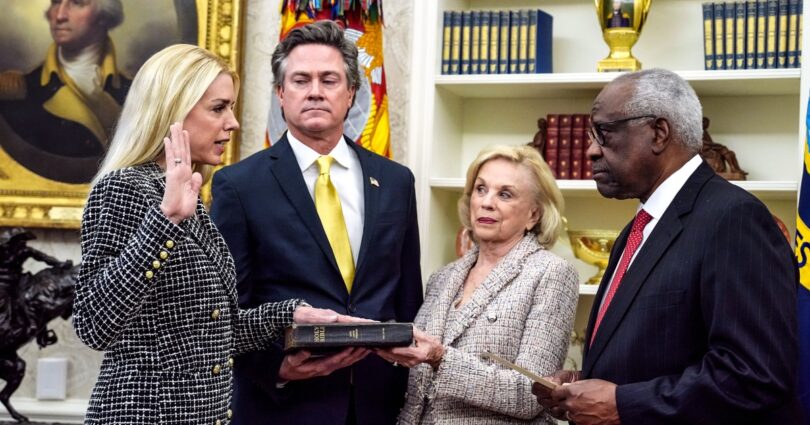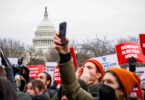In a little-noticed directive on her first day in office, Attorney General Pam Bondi ordered a halt to a years-old federal law enforcement effort to combat secret influence campaigns by China, Russia and other adversaries that try to curry favor and sow chaos in American politics.
Buried on the fourth page of one of 14 policy memos Bondi issued Wednesday, the order disbands the FBI’s Foreign Influence Task Force and pares back enforcement of the Foreign Agents Registration Act, despite years of warnings by U.S. intelligence agencies that foreign malign influence operations involving disinformation were a growing and dangerous threat.
“To free resources to address more pressing priorities, and end risks of further weaponization and abuses of prosecutorial discretion, the Foreign Influence Task Force shall be disbanded,” the order states.
It also states that criminal charges for violating the Foreign Agents Registration Act, which requires people to register when lobbying on behalf of a foreign nation, “shall be limited to instances of alleged conduct similar to more traditional espionage by foreign government actors.” The order adds that DOJ prosecutors instead “shall focus on civil enforcement, regulatory initiatives, and public guidance.”
A separate Bondi directive also disbanded efforts to seize the assets of Russian oligarchs, including Task Force Klepto Capture and the Kleptocracy Asset Recovery Initiative.
The order said the personnel working on those projects will be reassigned to target drug cartels and transnational criminal organizations. Forfeiture cases already underway will continue to be pursued, officials said.
Three squads of around 50 FBI agents and support personnel for the foreign influence task force are now looking for other assignments, an FBI official with knowledge of the matter told NBC News.
A Justice Department spokesperson said Bondi was traveling Thursday and that the order speaks for itself.
Created under Trump
Created in 2017 in the Trump administration, the FBI task force and its efforts to call out foreign disinformation was announced to a standing ovation by then-Deputy Attorney General Rod Rosenstein in a speech at a national security conference.
“The American people have a right to know if foreign governments are targeting them with propaganda,” Rosenstein said at the time.
Former Justice Department and FBI officials who worked on national security expressed shock at this week’s order.
“It’s astounding,” said Frank Figliuzzi, former head of FBI counterintelligence and an NBC News contributor. “It’s now a free for all for foreign intel services seeking influence.”
David Laufman, who headed the DOJ’s counterintelligence section in the Obama administration, said the order “raises serious questions about the new attorney general’s commitment to criminal enforcement when appropriate under longstanding law, as well as her commitment overall to combatting malign foreign influence operations in the United States.”
The first FBI director Trump appointed, Christopher Wray, long warned about the dangers of covert foreign influence campaigns, saying they were often designed to deepen American political divisions.
“The Chinese government is engaged in a broad, diverse campaign of theft and malign influence, and it can execute that campaign with authoritarian efficiency,” Wray said in 2021.
Last year, Justice Department prosecutors and FBI agents exposed an alleged scheme in which Russia-backed media funneled $10 million to a conservative U.S. media company that hired prominent right-wing influencers.
Although they are related, government efforts of tackling foreign influence and prosecuting Foreign Agent Registration Act violations have drawn the ire of President Trump and Republicans for different reasons.
The act required people « engaged in political activities » to « make periodic public disclosure of their relationship with the foreign principal. »
The Justice Department has prosecuted both Democrats and Republicans under the foreign lobbying law.
Three recent prosecutions carried out during the Biden administration involved Democratic politicians — against New York Mayor Eric Adams, Rep. Henry Cuellar of Texas and former Sen. Robert Menendez of New Jersey, who was convicted and sentenced to eight years in prison — facing charges of corruptly acting on behalf of organizations in Turkey, Mexico and Egypt and failing to register as a foreign agent.
Adams and Cuellar, who are both awaiting trial, have denied the charges.
Republican skepticism of criminal FARA prosecutions dates to the early days of the first Trump administration, when his national security adviser, Michael Flynn, was caught up in a criminal investigation and eventually admitted lying about his work for the Turkish government.
Trump’s campaign manager, Paul Manafort, also pleaded guilty to FARA violations involving Ukraine. Both men were later pardoned by Trump.
The Justice Department has continued to pursue FARA prosecutions, including some against people with ties to Trump.
Last month, GOP former House Speaker Bob Livingston published an op-ed in The Wall Street Journal in which he described an agonizing process of being the target of a FARA investigation that ultimately did not result in charges.
Republicans have also expressed outrage that Hunter Biden was never charged with FARA violations despite never registering as a foreign agent during his lucrative work on behalf of foreign governments. His lawyers maintained he was not lobbying and not required to register, something Republicans dispute.
Debate over foreign disinformation
Trump and some of his allies have long downplayed or made false statements about the Russian interference in the 2016 election that was documented by special counsel Robert Mueller and a bipartisan report by the Senate intelligence committee.
Trump allies bitterly opposed the effort by the FBI’s foreign influence task force to alert social media companies to disinformation on their platforms — a key aspect of the FBI’s work in this area.
That dispute came to a head in 2023, when a Missouri federal judge ruled that the FBI and other government agencies had been violating the First Amendment by flagging foreign influence and disinformation to social media companies and urging them to take it down.
In the wake of that ruling, the task force stopped briefing social media companies about foreign influence campaigns on their platforms. The Supreme Court later repudiated that view in overturning the Missouri judge’s ruling, and the briefings resumed.
Hunter Biden also features in this dispute — Republicans complain that the FBI left the impression with social media companies that stories about Biden’s laptop during the 2020 campaign may have been the product of a Russian foreign influence operation, when some in the FBI knew the laptop was genuine.
Andrew Bakaj, a lawyer and former U.S. intelligence officer who represented the whistleblower who reported on Trump’s attempt to solicit help from Ukraine to influence the 2020 U.S. election, accused Trump of opening the door to foreign countries aiding future campaigns by himself or his party.
“Voters and lawmakers on both sides of the aisle should rise to the defense of our democracy when one side unilaterally dismantles the team charged with preventing it,” said Bakaj. “Blinding our law enforcement to these threats is an open invitation to foreign powers to help the President and his allies win future elections.”
Source link








